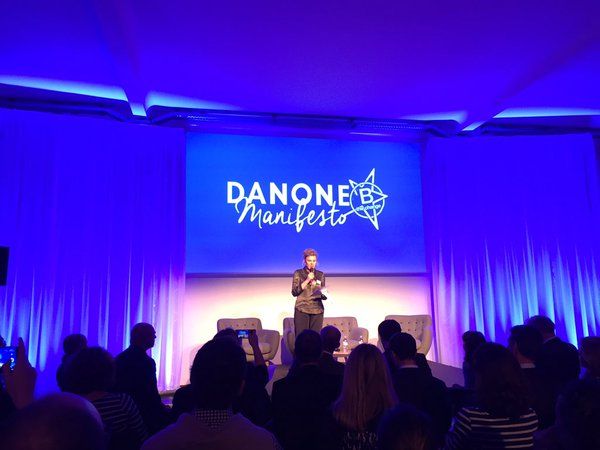Dancing With Change
A conversation with Lorna Davis, Chief Manifesto Catalyst at food company Danone
By Tim Leberecht
I met Lorna Davis for the first time in July 2015 at the inaugural Danone Day in Paris, a special event at which all of Danone’s (marketed in the US as ‘Dannon’) 100,000 employees worldwide convened virtually (and in person) to launch the Danone Manifesto, which described the food multinational’s lode star, its purpose and principles. Lorna’s job, in the newly created role of Chief Manifesto Catalyst, was not only to articulate the manifesto and roll it out, but also to help bring it to life for years to come, in Danone’s strategic decisions and everyday workplace culture.

Source: Danone/B Lab
A year later, I spoke with Lorna again at a conference, and she told me how Danone Day had become an annual event, how she had begun to design all meetings at the company more intentionally, and how she had gone about driving change, or as she calls it, “dancing with change,” in her organization. Inspired by her approach and Danone’s refreshingly idiosyncratic and humanist culture, I referenced one of her experiments with meeting formats in my upcoming TED Talk on “beautiful organizations” (to be released on November 3 on TED.com). She kindly agreed to answer a few more questions via email:
In my TED talk, I cite one of your leadership retreats as an example of how breaking conventions (specifically, in this case, playfully wearing masks and costumes) can help erase hierarchy and create intimacy within teams. Can you elaborate a bit more on what made you choose such format and how you implemented it?
We have been experimenting with different methods of supporting and encouraging creativity, collective intelligence, and breakthrough thinking for many years now. This particular meeting is one that we have been running for three years. It’s called ‘Oxygen,’ and we invite a multi-level, multi-cultural, and multi-functional group of about 100 to tackle a subject that needs our greatest wisdom, our highest selves, our most interesting thinking. It takes place at Evian in the French Alps, which is our ‘spiritual home.’ It’s the source of the water we bottle, and it is the source of much of our best thinking. We have a slightly different format each year, and this year, the group of people who put it together wanted a format which would allow us to tackle a new way to market our brands—making them ‘manifesto brands.’ This is a tough subject, and so we threw everything at it.
Every organization faces a fundamental tension between efficiency and culture. It seems that the two are at odds by design. How does Danone, and how do you as a leader, manage that conflict?
We all face many conflicts and paradoxes trying to run any business, and the balance of ‘mechanical order’ and ‘creativity and flow’ is challenging. We value openness and experimentation, and we try to embed success into a process once we have proven something.

Source: Danone
Your title—“Chief Manifesto Catalyst”—is rather unusual. What is your mandate, and would you recommend more organizations establish a role like yours?
My mandate is to bring the manifesto to life in the organization. You can see our manifesto online; basically, it sets out what we believe in. Once you read that manifesto, there are inevitable consequences of how a company which signs up to it must behave. For example, we say “food is health’s best partner.” We believe in that, and it drives everything from acquisition strategy (we are just in the process of buying WhiteWave Foods, which is a leader in organic and plant-based protein, amongst other things). I am tasked with engaging as many individuals as possible in the company on that journey, in helping to find a way to have that manifesto show up in the way we market our brands and making partnerships with people outside the company to support this journey (for example, the B Corps movement). I don’t think it’s a title for which many people or companies would have an appetite, but it’s an example of the courageous, creative style that we have, and I love it!
What is the single most important lesson you’ve ever learned about managing change in organizations?
I don’t think we ever “manage change.” I think we dance with it, or swim with it, or some other physical metaphor. The best example I can give is a family: Everyone has a family, and families are changing all the time. Our kids grow and change, and we age and develop, and all sorts of things happen, and we cope with them with as much grace as we can. Sometimes we have to be decisive—we move house, we change the kids’ school, or something—but the rest of the time, we just relate to each other the best we can. Businesses are just big families with a bit more structure, but the spirit is the same!
Would you consider Danone a “beautiful business”? If so, what does it mean to you?
It’s probably not a word I would use because it implies perfection and some sort of external evaluation. I use the word love because it is personal. I love this business—I experience it as human and inclusive and distinctive. Just like my family. It’s not perfect, but it’s mine!
To learn more about Lorna, her role, and the Danone Manifesto, read this extended interview with her on EVE.
This article first appeared on Psychology Today.